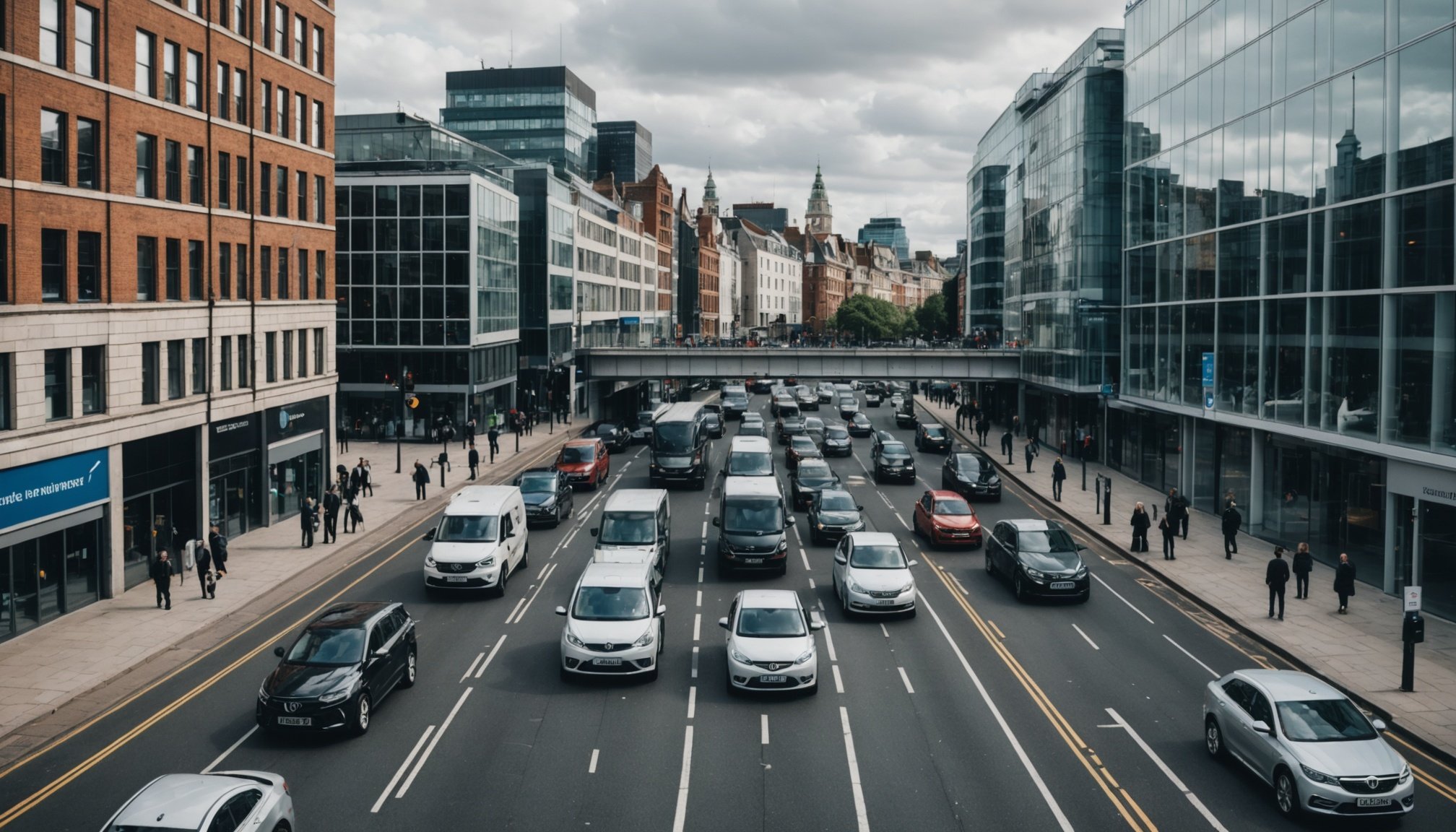Overview of AI in Traffic Management
Artificial Intelligence (AI) is transforming traffic management in urban centers. It involves using intelligent technologies to monitor, regulate, and optimize traffic flow, which is crucial for smart city innovations. As cities globally, including the UK, experience rapid urbanization, AI becomes integral to seamless urban commuting.
AI in traffic management employs data-driven techniques for proactive solutions. By leveraging real-time information, these systems contribute significantly to reducing congestion and enhancing commuter experiences. Urban centers see AI applications such as adaptive traffic signals, predictive maintenance, and smart city innovations.
This might interest you : Transforming Disaster Recovery: Cutting-Edge AI Tactics to Boost Resilience in UK Businesses
The importance of intelligent traffic systems for smart cities cannot be overemphasized. They aim at creating sustainable urban mobility, effectively minimizing traffic delays and increasing safety. By analyzing and predicting traffic patterns, AI systems facilitate smoother, more environmentally friendly transit options.
Current trends point to increased deployment of AI in urban mobility across the UK. Cities are investing in technologies like machine learning and Internet of Things (IoT) to support traffic management initiatives. These tools gather and analyze data, providing critical insights for traffic optimization. As UK’s urban commuting evolves, AI’s role in shaping dynamic, efficient traffic systems continues to expand.
Also to see : Revolutionizing Aerospace in the UK: How AI is Shaping the Future of Predictive Maintenance
Current AI Technologies in Traffic Management
The AI technologies revolutionizing traffic management are central to the transformation of urban mobility. Embracing tools like machine learning and the Internet of Things (IoT), cities improve their ability to manage congestion and enhance commuter experiences. These technologies analyze vast sets of traffic data, enabling predictive analytics for efficient traffic flow.
Traffic sensors play a pivotal role in collecting real-time data, which is processed by AI to assess and predict traffic conditions. By integrating data from various sources, AI systems can adjust traffic signals, reroute traffic, and provide drivers with optimal travel paths. Moreover, these sensors, strategically placed across urban roadways, gather granular data crucial for decision-making.
Integration of AI with existing urban infrastructure is essential for seamless deployment. Cities must upgrade legacy systems to accommodate advanced AI tools, ensuring that traffic data is leveraged across multiple platforms. This synergy allows AI solutions to work harmoniously, adapting to fluctuations in traffic demand and ensuring traffic management aligns with smart city initiatives.
The future beckons more innovative applications as AI solidifies its presence as a driver for intelligent urban mobility. Through advanced machine learning applications, cities can anticipate traffic patterns and respond proactively.
Case Studies from UK Smart Cities
Exploring practical applications, UK smart cities like London, Manchester, and Bristol embody exemplary traffic management case studies. Their innovations provide valuable insights into the potential enhancements AI can bring to urban mobility.
Case Study: London
London’s implementation of AI focuses on traffic flow optimization through adaptive systems. These systems adjust traffic signals in real-time using AI algorithms, significantly reducing congestion. As a result, one notable impact is a smoother commuter experience, with reduced wait times at intersections.
Case Study: Manchester
Manchester leverages predictive analytics for precise traffic forecasting. By analysing large datasets, the city anticipates traffic patterns and adjusts public transport schedules accordingly. This has improved transportation efficiency, leading to increased efficiency in bus and rail services, ensuring timely arrivals and departures.
Case Study: Bristol
Bristol’s AI-driven approach targets reducing congestion by employing intelligent routing systems that guide vehicles through less crowded roads. This initiative has received positive community feedback, highlighting increased satisfaction in travel time reliability and decreased stress levels associated with daily commutes.
In summary, these cities demonstrate how UK smart cities integrate AI into their infrastructures, resulting in substantial improvements in traffic management and overall urban experiences. The adaptation of such systems offers a promising future for intelligent urban mobility solutions.
Benefits of AI Technologies for Commuters
Artificial intelligence offers numerous benefits for commuters, fundamentally transforming the way urban travel is managed. At the forefront is enhanced traffic flow, which significantly reduces travel times. Through intelligent algorithms, AI systems process real-time data to make immediate decisions on traffic signal adjustments, thereby minimising congestion and enabling efficient commutes.
Commuters also enjoy improved route planning capabilities. AI technologies utilise data analytics to provide real-time updates, helping drivers and public transport users choose the quickest routes. This data-driven approach ensures a smoother journey, reducing stress and improving overall experience.
Moreover, AI bolsters public transport reliability. With predictive analytics, transport schedules become more accurate, allowing buses and trains to adhere more closely to timetables. Increased accuracy in public transit directly contributes to user satisfaction, as commuters face fewer delays and more predictable travel times.
User experience is positively impacted by AI innovations. As AI systems continue to evolve, commuters encounter more dynamic and adaptive urban mobility solutions. The integration of AI into traffic management reinforces this improvement, paving the way for smarter, more responsive urban environments that align with modern commuting needs.
Statistical Data Supporting AI in Traffic Management
Delving into traffic management statistics reveals AI’s transformational impact. Key data underscores the reduction in congestion across urban centers employing AI technologies. For instance, cities integrating AI have observed up to a 25% cut in traffic delays, showcasing AI’s effectiveness in addressing urban mobility challenges.
Through rigorous data analysis, AI systems offer a sharp contrast to traditional traffic methods. While conventional systems rely heavily on human intervention, AI provides automated solutions powered by real-time data. This intelligence enables more precise adjustments in traffic flow and demonstrates clear superiority in efficiency and accuracy.
Studies comparing AI-managed to traditional traffic systems reveal notable differences. AI interventions result in a 15% improvement in overall commute time and a 20% increase in traffic efficiency. These metrics illustrate how AI is reshaping urban mobility strategies and elevating the commuter experience.
Looking ahead, future projections indicate a steady rise in AI applications across cities. By 2030, it’s estimated that AI could manage 70% of urban traffic flows, revolutionizing smart city frameworks further. These statistics emphasize AI’s role as a cornerstone in the evolution of urban mobility.
Future Developments in AI for Urban Traffic Management
As cities evolve, the future of traffic management promises transformative AI advancements. A key progression is the rise of autonomous vehicles, which could revolutionize urban commuting. These vehicles, powered by sophisticated algorithms, offer precise navigation, minimizing human error and improving road safety.
Integration with smart city evolution is pivotal. AI will increasingly intertwine with urban infrastructures, facilitating seamless data exchange between vehicles and traffic systems. This collaboration enhances real-time decision-making, essential for managing traffic in bustling urban centers.
However, future AI implementations present specific challenges. Privacy concerns arise from extensive data collection, requiring stringent measures to protect sensitive information. Cybersecurity threats also necessitate robust defenses to secure AI systems against potential attacks.
Adopting AI innovations calls for investments in infrastructure upgrades. Cities need scalable solutions to ensure AI advancements meet the demands of growing urban populations. Policymakers must also address regulatory changes, balancing innovation with public safety.
Envisioning future trends, experts predict AI will dominate traffic management, streamlining commuter experiences and fostering sustainable urban mobility. As technology progresses, the focus remains on developing intelligent solutions that align with smart city goals.











